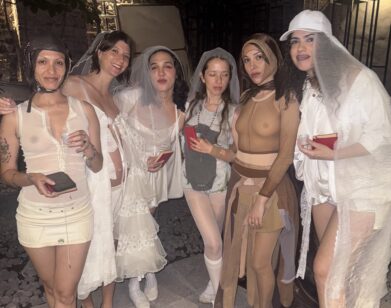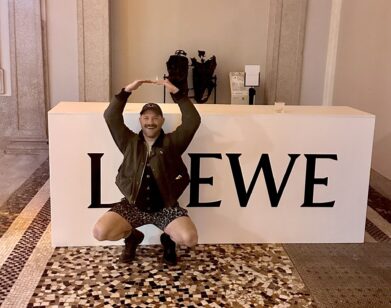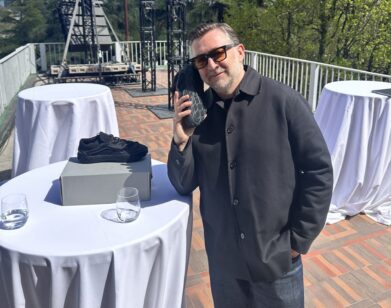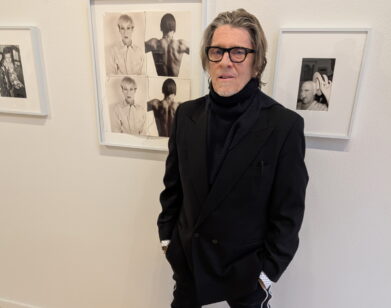Agent Scully
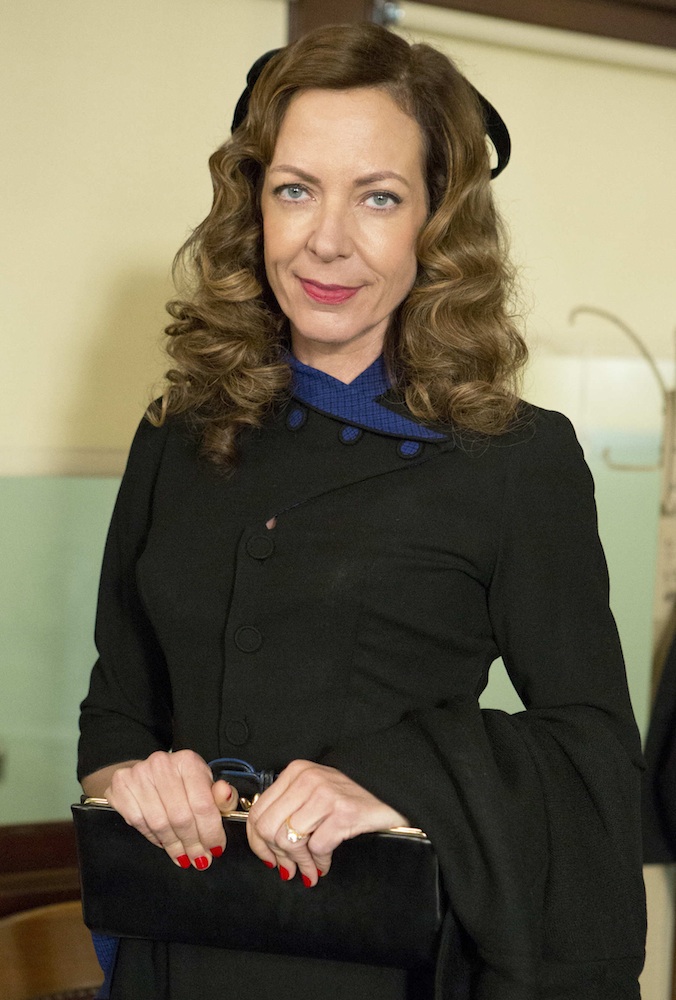
ABOVE: ALLISON JANNEY IN MASTERS OF SEX
“It’s kind of fun to be current again,” says Allison Janney of her return to television. It is quite a return: the 54-year-old actress is currently starring in two new and disparate shows. In Showtime’s period drama Masters of Sex, based on the sex studies conducted by Dr. William Masters and his partner Virginia Johnson, Janney plays Margaret Scully, a confused and compassionate well-to-do housewife who struggles to understand why her marriage is disintegrating. Her performance is understated and affecting, and Margaret’s story is a small tragedy of her time. As Bonnie on CBS’s Mom, however, Janney is brash and outrageous. A former alcoholic and drug addict and the matriarch of a family of teen moms: her daughter, played by Anna Faris, and her granddaughter.
On the phone, Janney seems much closer to Margaret than to Bonnie. She is soft-spoken, thoughtful, and quietly funny.
EMMA BROWN: When did you know that you wanted to be an actress?
ALLISON JANNEY: I think I just started going in that direction because my mother was an actress and that’s where I got the most positive reinforcement in high school and college. I never thought I’d be able to make a living doing it. I didn’t think that was a possibility for me at six feet tall. Then I had people that became my mentors, like Paul Newman and Joanne Woodward, whom I met at Kenyon College. Joanne insisted I come to New York and go to the Neighborhood Playhouse to study acting. I was easily led, I was pulled along and I was like, “Okay. I’ll go here; I’ll go there.” Joanne started an acting company—a theater company—we started doing plays; I got an agent… everything started snowballing. I went slowly into the night. My first award for The West Wing, I made a speech at the SAG Awards: “I think I can finally admit I’m an actress after all these years I wanted to say I was something else.” I was embarrassed to say I was an actress because I wasn’t really working.
BROWN: I know you met Paul and Joanne when Paul directed a play at Kenyon.
JANNEY: Paul Newman went to Kenyon. They built this new theater there, and they christened it by having him direct the first play. Michael Cristofer, who won the Pulitzer for The Shadow Box (1977), wrote this play and Paul directed it. I auditioned for him, which was nerve-wracking; he picked me for one of the chorus girls. There weren’t any great parts for women in it, but he cast a bunch of the college girls as cheerleaders in this cross-country race. It was 1940s style, so I think I had a different look that he thought would work. I’m thrilled because he is a lovely man and was very supportive of me as an actress. He always said he’d do a favor for me if I ever needed one. I never called him on it because I never thought the favor was good enough. I wanted to hold onto it. It gave me a lot of confidence.
BROWN: Did your parents encourage you to take up acting?
JANNEY: They didn’t encourage me at all to do it. My mother was an actress, so she understood it. I think they were happy to have me do it, but they were probably thinking and hoping that I would get a real job. I think they’re just as surprised as I am that it kind of worked out for me. [laughs]
BROWN: Did you ever have a day job?
JANNEY: Yes, I did. I scooped ice cream at a café down on Spring Street. I was a nighttime receptionist at a recording studio on 49th street. All these cool musicians would come in and do jingles—that’s how they made their money, their bread and butter. My father is a musician, and my brothers were. Music’s just been in my life, so I loved it. Then I got a soap opera. I got Guiding Light. That was really exciting—I could pay my rent.
BROWN: Have you ever gotten a script where the character was described as an “Allison Janney type”?
JANNEY: I haven’t. I had that in a voice-over audition, one that I didn’t get. [laughs] Someone said, “I want you to sound like Allison Janney.” I was like, “I am Allison Janney.” And they’re like, “I know, but you’re not sounding like yourself today.” I didn’t get it! That’s the height of bad luck.
BROWN: Your character’s storyline on Masters of Sex is so heartbreaking.
JANNEY: I know, and she’s not a victim, though. She’s an inquisitive, smart woman who just wants to get to the bottom of it, even if that means going to a hotel and talking to a hooker to find out what do married men want—”What can I do to please them?” She’s determined. She can’t understand it. It’s heartbreaking because he can’t tell her. You can’t be a gay man in the ’50s. It was not accepted behavior, especially for someone who’s married to a woman. There’s just so much at stake for both of them. That was amazing, to play that out.
BROWN: It really seems like they do love each other deeply.
JANNEY: Oh, yeah. That makes it even more confusing. “You see me naked and you don’t look at my body, but I know you love me.” Just heartbreaking that he can’t bring himself to tell her. When the prostitute tells her, it’s just a funny moment to play because I was half laughing out of nervousness. She can’t even compute that that could have possibly been the answer all along, and yet there’s a certain amount of relief there: “My god. It makes sense!” Yet she’s uncomfortable. I could do those takes over and over again. It was that kind of work that you wanted to keep doing it: “I can do it in a different way!” It was really rewarding work to do.
BROWN: What advice would you give Margaret?
JANNEY: At this point, I would tell her that she deserves to be loved the way she wants to be loved. I’d say, “If you love him and you guys are great together, stay in it and have your dalliances. Be in the sex study.” I believe they really do love each other, but their marriage can’t go on the way it has been, unless they have an understanding. Whatever she decided to do, I would support her. [laughs] I think just knowing the answer—knowing it’s not her—has got to be the biggest relief. She might be able to deal with it. I don’t know what they’re going to have her do.
BROWN: Were you aware of Masters and Johnston before the show? I knew nothing about them.
JANNEY: Yes, I was. I had never really read up on them, but I knew about the sex studies. I was born in ’59, so I was not quite 10 when they were doing these studies. I did a human sexuality class in high school; it was called Bio 450, and I think we studied Masters and Johnson then.
BROWN: Really?
JANNEY: Yeah. I went to a boarding school in Connecticut, very advanced. [laughs] It was a very risky class. “Oh my god, you’re taking Bio 450?” They talked about condoms and sex. I don’t think we studied homosexuality. It was more about male/female intercourse and sex and hormones and pictures of penii and vaginas, which was always fun in high school to look at. [laughs] We’d have little sessions where you’d break down in groups and talk about, “Well what happens if you’re in a situation and someone wants you to…” We’d do play acting with different situations that could come up [during] your first sexual encounter: What would you say? It was kind of a great class, and very memorable. Probably the only one I remember from high school. [laughs] It was very advanced for the school I went to. I think parents were a little shocked. That was back in—Jesus— ’70-something.
BROWN: I thought no one was shocked in the ’70s.
JANNEY: Oh, sure they were. There weren’t a lot of classes on human sexuality in high school in the ’70s. I grew up in Ohio and went to a very small school, so I grew up in a little Ohio bubble and I wasn’t’ aware of what was out there in the world.
BROWN: You’ve said that your other show, Mom, isn’t one of those 18-hour-days television shows. Is that true?
JANNEY: It’s kind of the dream kind of scenario for actors, especially for Anna [Faris], who has a baby. You have lives outside of your work. This, I find an incredibly face past creative environment. You get in there, you play. It’s very creative and requires a lot of your presence in working and rehearsing, but it’s intense and then you go home. We pre-shoot on Thursday and then we tape in front of a live audience on Friday, and that’s the longest day. It’s kind of a drama job; a great amalgamation of all the different modes. I’m really happy that I’m doing it.
BROWN: Does the live audience change the way you perform your lines?
JANNEY: Oh, yeah. They definitely feed me. If they start laughing, I milk a moment. I will keep doing whatever to make them laugh. It eggs you on, encourages you to go further or pull back. That being said, I like the pre-shoot days, too. You can go take after take and try things a little differently. You have a little more wiggle room for error. Even though the audience loves it when we mess up. I learned that very quickly, and that takes the pressure off.
BROWN: I was about to ask you when you last time forgot your lines was.
JANNEY: It happened the last show we taped. They come in during the taping and give you new lines to say in front of the audience. You do one take and then they run in and go, “Okay, this time you say this and then say that and say this at the end.” And you’ve got to learn it right there. Sometimes you just go up and go, “Okay, I can’t remember. I have no idea.” And then the audience laughs and you remember and you do it again. It’s a three-ring circus. There’s a comedian that warms up the audience and keeps them going while when we’re working on scripts. There’s dancing. It’s crazy. You can’t believe that people are trying to act in the middle of all of the noise. It’s a circus. I like it.
THE SEASON FINALE OF MASTERS OF SEX WILL AIR THIS SUNDAY, DECEMBER 15, ON SHOWTIME. YOU CAN WATCH THE ENTIRE SERIES ON SHOWTIME ANYTIME. MOM AIRS MONDAYS ON CBS.


